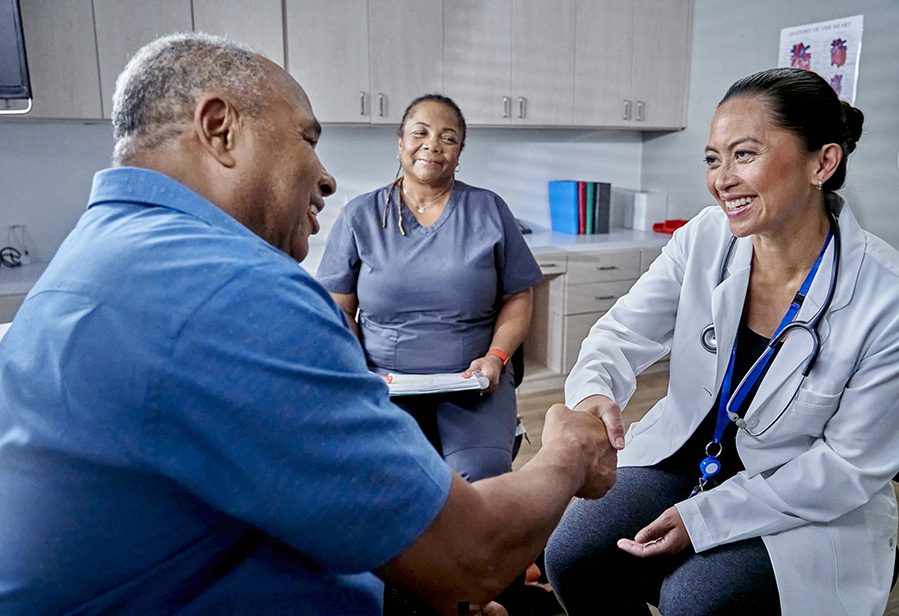Chickenpox is a viral infection characterized by fever and itchy, red spots throughout the body. It is caused by the varicella-zoster virus and is highly contagious to those who have not yet been infected with it, though usually benign to those who have been.
Our pediatric specialists will provide quality care that can help mitigate and diminish the uncomfortable effects of chickenpox.
What are the symptoms?
A chickenpox rash usually appears between 10 and 20 days after infection and remains for around 5 to 10 days. Symptoms are often more severe in adults than in children, and may include:
- Flu-like symptoms: Including headache, stomachache, sore throat and fatigue
- Fever: A fever in the range of 101to 102 degrees is often experienced for a few days prior to other symptoms
- A general feeling of illness: Chickenpox is a viral infection, and the onset usually includes general feelings of malaise
Chickenpox is also characterized by a rash which usually appears a couple of days after other symptoms occur.
The rash typically goes through three phases:
- Red or pink bumps: After a few days, a chickenpox rash consisting of itchy red or pink bumps appears and continues to break out over the next couple of days
- Blisters: About a day after the onset of the rash, fluid-filled blisters begin to show
- Crusting and scabbing: As the blisters break, they become crusty and scabby which prolongs the healing duration
Since bumps often continue to appear and go through these 3 phases, all three conditions may be experienced simultaneously. The rash may also cover the entire body, and can occur in the eyes, throat and mucous membranes.
What are the causes of chickenpox?
The onset of chickenpox is the result of a non-infected person coming into contact with the varicella-zoster virus (VZV), which can be easily spread through coughing, sneezing or contact with lesions. Once contracted, VZV remains in the nervous system for life, though mostly in a dormant state.
When is it time to see a doctor?
While chickenpox is usually a mild and controllable condition requiring little more than time and bed rest for recovery, complications can occur. These may be due to conditions stemming from the rash or from the illness itself and can include bacterial skin infection, blood poisoning, toxic shock syndrome, pneumonia, dehydration and swelling of the brain.
Children who are given aspirin while infected with chickenpox are also at higher risk of Reye’s syndrome, which is a rare disorder that causes liver and brain damage. These conditions are all considered serious and can lead to death if left untreated.
Is chickenpox contagious?
Chickenpox is highly contagious to anyone who has not yet had it, though rarely to anyone who has. While the virus continues to live in the nervous system for life once infected, it is only contagious during the initial outbreak, or later should a shingles outbreak occur. During either, chickenpox can easily be spread through bodily fluids such as from sneezing, coughing, or physical contact with skin lesions.
What are the complications and risks of getting chickenpox?
If you have never had chickenpox and are not vaccinated against it, you are at risk for infection. Once infected, the VZV stays in the nervous system for life where it is mostly benign. However, it can later reemerge as shingles, which is a painful, blistering skin condition affecting either the left or right side of the body, though rarely both. This happens most commonly in older adults or those with weakened immune systems, and the virus can return to dormancy for years before reoccurring.
Babies born to mothers who are infected with chickenpox early in their pregnancy are at risk for limb abnormalities and low birth weight. However, if an infection occurs just before birth, the baby is at risk for a much more serious life-threatening infection.
While chickenpox is normally considered a mild illness, it can also lead to other complications such as:
- Bacterial skin infections which can worsen and enter the bloodstream
- Reye’s syndrome, especially if aspirin is given to a child infected with chickenpox
- Toxic shock syndrome
- Pneumonia
- Dehydration
- Swelling of the brain
Can chickenpox be prevented?
The next most common question following “What does chickenpox look like?” is, “Can it be prevented?” The chickenpox or varicella vaccine can help prevent chickenpox. Despite chickenpox having once been a common condition in children and teens, it is now much rarer because of this.
The vaccine provides complete protection in up to 98% of those who have received both required doses, and it significantly lowers the severity of those who contract chickenpox despite being vaccinated.
The varicella vaccine is recommended for:
- Young children: Children should receive their first shot between the ages of 12-15 months, followed by a booster at 4-6 years of age;
- Older children: Those age 7-12 who have never been vaccinated need 2 doses given at least 3 months apart. Children older than 13 can receive catch-up doses at least 2 months apart;
- Adults: Adults who have never been vaccinated–particularly high-risk individuals such as schoolteachers or childcare workers–should receive 2 doses of the vaccine 1 – 2 months apart.
Varicella vaccination or proof of immunity to varicella is required for public and private school entry throughout the United States. If you are unsure whether you have been vaccinated or exposed to the chickenpox virus, your specialist can perform a simple blood test to tell you.
How can I treat my child with chickenpox?
Chickenpox is usually diagnosed from its rash, though sometimes through laboratory tests. Once it is confirmed, chickenpox treatment is often unnecessary in otherwise healthy children due to its mild nature. However, this does not mean the condition cannot result in complications, or that it should be ignored. For instance, lesions can become infected, which is dangerous and may require antibiotics.
As far as a treatment to comfort your child, antihistamines and anti-itch remedies like calamine lotion and cool compresses may be used. Socks or mittens may also be placed over the hands to prevent injuries to the rash from scratching, and antiviral drugs may be prescribed to shorten the duration of chickenpox for those at high-risk for complications. However, NEVER give your child aspirin for relief of symptoms due to the risk of Reye’s syndrome, a serious condition linked to the use of aspirin or aspirin products while recovering from viral infections. Only acetaminophen should be given.
Should my child get a chickenpox vaccine?
While in most cases chickenpox is a mild condition, it can have complications that may lead to worse, more dangerous conditions. However, this once-common illness is now lesser-known due to the chickenpox vaccine, which can help prevent both immediate complications and the occurrence of shingles later in life.
According to the U.S. Centers for Disease Control, the vaccine immunizes 98% of those who have received both required doses of it, and significantly reduces the severity and duration of the illness in those who it doesn’t fully immunize.
Some may experience a low-grade fever or mild rash after injection, and other rare but dangerous side effects, such as severe allergic reaction, seizures, and pneumonia may occur. Talk to your specialist to help determine if the risk to your child outweighs the risk of not being vaccinated.
Speak to us to learn more about the chickenpox vaccine
When it comes to the health of you and your children, leaving things to chance is simply not an option. If you or your child has never been infected with chickenpox — or if you are not sure of your vaccination status — schedule an appointment with an Intermountain Health pediatric specialist and speak to them about getting vaccinated. Doing so will help you and your family avoid potentially dangerous complications from the chickenpox virus.





